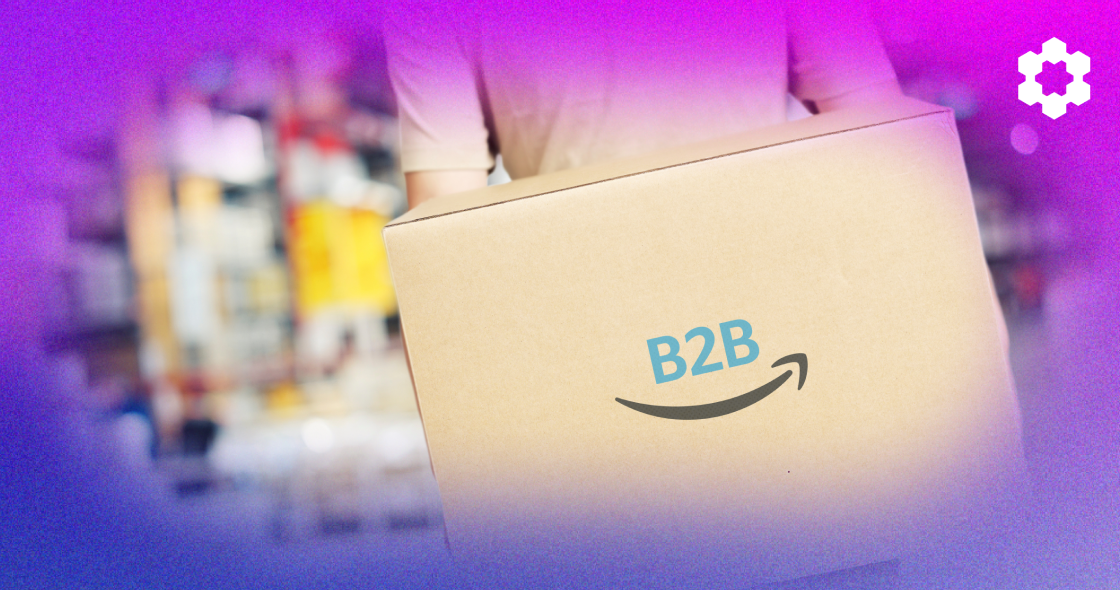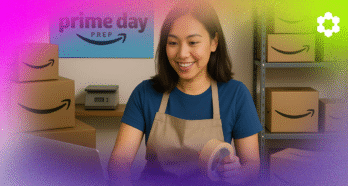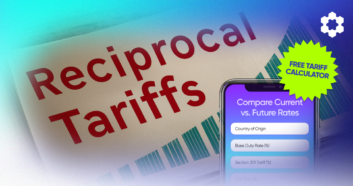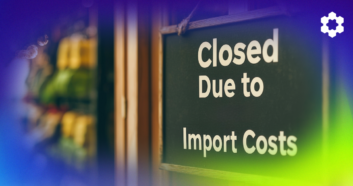Let’s dive into this week’s Amazon seller updates and improvements:
- Amazon Business is now expanding into replenishment services to help businesses optimize stock levels and reduce overhead.
- Amazon announced a new collaboration with Jüsto, Mexico’s rapidly growing grocery retailer, to offer same-day grocery delivery.
- Amazon is extending its Prime Air drone delivery service to the Phoenix area, with a new base in West Valley, bringing rapid drone delivery a step closer to mainstream availability.
- Sellers should take note of the updated Valid Tracking Rate guidelines, which could impact delivery metrics.
- Content uploaded to product detail pages can now be displayed automatically on shared global listings across multiple Amazon stores.
Read on to learn what these changes mean for your business and how to make the most of them.
1. Amazon Business Expands into Stock Replenishment Services
Amazon officially announced its AB Restock program at the Amazon Business’s Reshape conference, the new program offers two options for B2B customers: Managed Inventory and Vending.
These features promise to reduce the hassle of managing stock levels, thanks to Amazon’s network of technicians, cutting-edge technology, and convenient restocking processes.
What is Amazon Business (AB) Restock?
AB Restock is a replenishment program designed to keep workplaces supplied with essential items. It includes two key services:
- Managed Inventory: Amazon Business technicians visit customer sites, regularly restocking stockrooms or designated storage areas with essential supplies. Products are reordered automatically based on real-time usage, preventing stockouts and maintaining operational flow. This service is currently available in select US cities, with plans to expand.
- Vending Machines: Starting in early 2025, Amazon Business will roll out internet-connected vending machines that provide on-site inventory for items like Personal Protective Equipment (PPE) and IT accessories. Employees can access products via code or ID scan, and administrators can set limits to control product access, quantity, and spend. Low stock alerts prompt automatic reorders to prevent outages, ensuring seamless access to crucial supplies.
AB Restock Advantages for Sellers
- Consistent Demand: Sellers with products in high demand for business operations (e.g., safety equipment, tech accessories) could benefit from consistent sales as companies automate replenishment.
- Reduced Supply Shortfalls: AB Restock aims to prevent stockouts, which helps sellers keep up with a reliable demand pipeline.
AB Restock Limitations
- Increased Competition: As Amazon moves into managed services, smaller suppliers may face additional challenges competing with Amazon’s streamlined and cost-efficient model.
- Dependency on Amazon’s Processes: Businesses relying on Amazon’s data insights may find it challenging to maintain flexibility or control over inventory practices if Amazon alters service offerings or data access policies.
2. Amazon Partners with Jüsto for Same-Day Grocery Delivery in Mexico
Amazon Mexico is making a major move in the grocery delivery market by teaming up with Jüsto, one of the region’s top online grocers. This partnership aims to give customers access to a wide range of fresh grocery items, including produce and private-label products, with the promise of delivery within four hours of order placement.
Initially available in select neighborhoods in Mexico City, the “Jüsto on Amazon” offering will soon expand to cities across the country.
How It Works
Through this collaboration, Jüsto’s full product range is now available to Amazon Mexico customers in a dedicated Jüsto storefront on the Amazon website.
Customers can browse Jüsto’s inventory in real time and order with a minimum value of approximately $25. All customers are eligible for free delivery on orders over $1,000 MXN, with additional promotions available to Prime users and Jüsto loyalty program members.
With around 68% of Jüsto’s products sourced from small to medium-sized businesses, these suppliers stand to benefit significantly from the partnership with Amazon. According to Jüsto’s founder, Ricardo Weder, some small producers are seeing sales soar to 5 to 7 million MXN per month, thanks to the expanded reach.
Sellers in the consumer packaged goods space may want to keep an eye on this partnership and consider the benefits of a MX strategy in the coming year.
Optimize your business with SellerAssist by Carbon6. A specialized team of seller support professionals will manage your inventory, catalog, brand registration, promotions, account health, and case submissions, all while providing valuable insights and guidance at every stage.
Strategic Value for Amazon’s Broader Growth in Mexico
Amazon’s partnership with Jüsto is part of a larger strategy to solidify its presence in Mexico and the broader Latin American market.
Earlier this year, Amazon Mexico introduced “buy now, pay later” options through a partnership with Kueski, a popular installment payment provider.
Combined, these initiatives create an opportunity for Amazon to replicate its US model in Latin America, where it owns Whole Foods Market and operates Amazon Fresh-branded stores. In Mexico, however, the approach is collaborative, leveraging Jüsto’s local market knowledge and logistical strengths.
As the rollout expands across Mexico, both sellers and customers should keep an eye on the evolution of Amazon MX. These steps are signaling Amazon’s commitment to continued expansion into Latin America.
3. Amazon Expands Prime Air Drone Delivery to Phoenix
After securing FAA clearance, Amazon announced its expansion into the West Valley area of Phoenix, Arizona. Customers in Tolleson and surrounding neighborhoods can now enjoy fast, drone-powered delivery on thousands of essential items.
How Amazon’s Prime Air Drone Delivery Works
Prime Air is now available to customers in West Valley, Arizona, with access to more than 50,000 eligible products.
By using the MK30 model drone, Amazon can deliver items weighing under five pounds in less than an hour. This service is ideal for small essentials like household supplies, tech accessories, and beauty products.
Once an order is placed, the drone picks up the item at Amazon’s Tolleson fulfillment center and delivers it directly to the customer’s yard, landing briefly to drop off the package before returning to base. The FAA granted Amazon permission to operate drones in the area just a week ago, showing the company’s rapid approach to making drone delivery more widely accessible.
The MK30 drone model has several advancements, including:
- Higher Speed and Range: Capable of flying up to 50 mph at an altitude of 400 feet, the MK30 can now cover twice the distance of previous models.
- Enhanced Safety Features: Equipped with “sense and avoid” technology, it can detect and navigate around people, pets, and obstacles, allowing for safer operation in densely populated areas and smaller backyards.
- Reduced Noise Levels: Amazon has worked to reduce the noise of the MK30, making it more neighborhood-friendly.
In the battle for last mile logistics, Amazon continues to lead innovation. Drone delivery could dramatically reduce the fulfillment cost, making FBA more profitable for Amazon. Whether savings will be past on to sellers in the future remains to be seen.
4. Amazon’s New Valid Tracking Rate Guidelines: A Boon or a Barrier for Small Sellers?
In an effort to improve delivery transparency and reliability, Amazon has announced an update to its Valid Tracking Rate (VTR) guidelines, requiring sellers to provide tracking information on a broader range of shipments.
This updated policy, set to take effect January 15, 2025, mandates that seller-fulfilled shipments to the United States from certain countries—including China, Canada, and the UK—include valid tracking information.
The policy’s intent is clear: improve the customer experience through better visibility and accountability on packages. But for many small and international sellers, the new VTR rules come with major challenges.
How the Updated VTR Policy Works
Under Amazon’s revised VTR policy, sellers shipping to the US must adhere to new tracking requirements based on package value and country of origin. Packages valued under a certain dollar threshold must have at least one valid carrier scan, while higher-value items need two scans.
The specific requirements are as follows:
- From China, Canada, American Samoa, or US Minor Outlying Islands: Packages under $5 USD must include one scan, while packages valued over $5 USD must have two scans—one from when the package arrives at the carrier facility and one upon delivery or attempted delivery.
- From the UK and India: Packages under $15 USD require one scan, while those over $15 need two scans.
Additionally, certain products are exempt, including:
- Digital products
- Domestic packages shipped via untracked USPS services under $10 USD
- Packages shipped from the UK or India valued under $15 USD using Amazon-integrated carriers without tracking.
Enhanced Tracking for Customers and Reduced Fraud
Amazon’s VTR update has clear benefits for customers.
- Enhanced Customer Experience: By requiring consistent tracking data, Amazon can provide a more reliable shopping experience. This minimizes “lost package” scenarios that often lead to customer frustration and seller costs.
- Improved Delivery Issue Detection: With better tracking visibility, Amazon can identify and address potential delivery issues more quickly and effectively.
- Protection Against Fraudulent Claims: The tracking updates also benefit sellers by reducing fraudulent claims. Untracked shipments have previously allowed dishonest customers to claim non-receipt for refunds.
- Increased Proof of Delivery for Sellers: Mandatory tracking scans give sellers additional proof that items were delivered, which helps decrease the likelihood of refund disputes.
High Shipping Costs and Practical Challenges for Small Sellers
For many small and international sellers, however, the new policy raises serious concerns.
1. Rising Shipping Costs for Low-Value Items
Many sellers have noted that the VTR requirements make it financially difficult to ship low-cost items, especially across borders.
A Canadian handmade seller shared their frustration, explaining that tracking to the U.S. would cost at least $10 for products valued between $5 and $8. “No one would be willing to pay shipping fees like this for low-value items,” they stated, adding that the policy effectively forces small businesses off the platform.
2. Limited Shipping Options and Confusion Around Exemptions
Several UK-based sellers expressed confusion over what qualifies as an Amazon-integrated carrier with untracked service for packages under $15.
A common carrier for UK-to-US shipments, Royal Mail, typically hands off packages to USPS, but does not always meet Amazon’s tracking requirements.
One seller commented that they’ve been using Royal Mail, but now their only option is DHL at over $20—completely infeasible for letter-sized, low-cost goods.
Sellers who already operate on thin margins are concerned these restrictions will make their businesses unsustainable.
3. Challenges with Carrier Scanning Reliability
Another hurdle lies in the carriers’ inconsistent scanning practices.
Amazon’s updated policy relies on the assumption that carriers will reliably scan packages at each required checkpoint. Yet, many sellers report that scans frequently fail or are not recorded properly, especially for deliveries left at counters or drop-off points.
One seller emphasized that getting a scan at a carrier facility can mean “waiting in line” to personally oversee it, a time-consuming process that may not be feasible for every seller.
Your Next Move
Amazon’s updated VTR guidelines reflect its commitment to enhancing customer experience through increased transparency and reliability. However, the policy also presents tough new requirements that will likely impact smaller sellers disproportionately, particularly those outside the US.
As the January 2025 deadline approaches, assess your shipping options, consider FBA where viable, and consider adjusting your fulfillment strategies in 2025.
While these changes may make Amazon a safer and more reliable platform for customers, the impact on small, international sellers could be considerable. With more feedback and possibly further adjustments from Amazon, time will tell if the updated VTR guidelines can balance customer satisfaction with a viable environment for sellers.
4. Amazon’s New Video Sharing Feature Simplifies Global Listings for Sellers
Amazon has recently introduced a valuable feature for sellers, enabling videos uploaded to product detail pages to automatically display on shared listings across multiple Amazon stores worldwide.
Streamlining Video Management for Global Listings
Previously, sellers managing product listings in multiple regions had to upload videos individually to each Amazon store.
Now, with Amazon’s updated process, sellers can upload a video once, and it will automatically appear on shared global listings in multiple countries.
To get started:
- Navigate to the Upload Video tool on Amazon Seller Central, upload your video, and have it displayed on relevant global listings without additional steps.
- You can also choose to manage where videos are displayed if you wish to limit certain regions.
- Visit the Upload and Manage Videos page to view a list of stores where each video appears. If you prefer to exclude a video from particular Amazon stores, simply click the trash icon next to the video, select “Delete from other stores,” and specify which regions to remove.
Considerations for Sellers with Regional Specifics
- Content Relevance Across Regions: Not all products or marketing messages are appropriate for a global audience. Products with region-specific uses or legal considerations might require different video content to be suitable for local standards or preferences. Review your videos carefully to ensure they’re appropriate for all regions where they’ll be displayed.
- Cultural and Language Differences: Although videos are effective for reaching global customers, cultural differences may affect customer interpretation of the content. Sellers with nuanced product messaging or localized brand voices may still need to create customized videos for each region.
A Welcome Feature for Expanding International Sales
Amazon’s video-sharing update is a powerful tool for sellers looking to streamline their global operations and boost customer engagement. While some considerations exist for sellers with region-specific content needs, Amazon’s easy-to-use controls allow for flexible content management, allowing sellers to grow their international footprint with minimal added effort.
Maximizing Amazon’s Latest Updates for Your Business
Here’s how you can take advantage of these updates, along with tools from Carbon6 that can further optimize your workflow.
1. Leverage Amazon Business’s AB Restock
Sellers offering high-demand business supplies can benefit from Amazon’s new inventory services, which ensure stock consistency and potentially steady revenue. Learn more about this program and whether it is an opportunity for your business.
Inventory management tools like SoStocked can provide forecasts, which can help identify the demand patterns ideal for fast-moving goods suitable for AB Restock.
2. Expand Reach with Same-Day Grocery Delivery Partnerships
For grocery sellers on Amazon Mexico, the partnership with Jüsto provides an incredible opportunity to reach more customers. Keep an eye on Amazon’s Latin America expansion to decide whether investing in a MX strategy might be beneficial to your business in 2025.
3. Adapt to Prime Air’s Drone Delivery Potential
Drone delivery is poised to reshape fulfillment for lightweight, high-demand products. Sellers with eligible products should evaluate how they can cater to this segment.
4. Comply with New VTR Guidelines
Amazon’s VTR guidelines can benefit sellers who effectively plan for the changes by focusing on trackable shipping options or Amazon’s FBA. Using carrier tracking tools, sellers can gain insights into VTR requirements, monitor compliance, and efficiently handle shipping-related inquiries, helping them to maintain competitive advantage in Amazon’s evolving marketplace.
If you are struggling to stay compliant, using tools like SellerAssist by Carbon6 can be valuable. SellerAssist can keep your tracking information up-to-date and provide ongoing catalog management and account health monitoring.
5. Enhance Global Presence with Video Content
The new video-sharing feature helps sellers streamline their international strategy by displaying product videos across multiple stores. Video content can significantly boost engagement, and content creation service providers like SellerAssist’s Creative+ can help sellers analyze which videos resonate most across different regions, providing insights for future video strategies.
Overall, staying informed and using Carbon6 tools to enhance efficiency enables Amazon sellers to navigate and thrive within the ever-evolving ecommerce landscape. Adapting to these updates creates new growth avenues, streamlines operations, and offers customers an optimized shopping experience.




